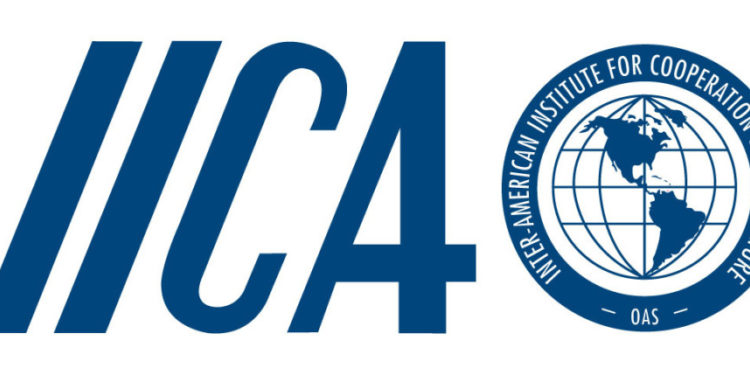| IICA Director General Manuel Otero; Secretary of Agriculture and Livestock of Honduras, Laura Suazo; and Minister of Agriculture and Agri-Food Canada, Marie-Claude Bibeau. |
| Washington, 12 May 2023 (IICA) – Reducing gender inequalities and ensuring the participation of women in decision making creates tangible benefits for rural well-being and for agricultural resilience. This was the main conclusion of a debate among ministers of Agriculture, private sector representatives and researchers at the Aim for Climate (Agriculture Innovation Mission for Climate) Summit – a joint initiative of the governments of the United States and the United Arab Emirates. The latter will host this year’s COP28 meeting, with a mission to increase investments in climate smart agriculture and agrifood system innovation. Director General of the Inter-American Institute for Cooperation on Agriculture (IICA), Manuel Otero, is one of more than 1,000 participants attending the Summit in Washington, among them members of international delegations, ministers, private sector and civil society representatives, farmers, researchers and academics. The event is co-led by the United States Secretary of Agriculture, Tom Vilsack, and the Emirate Minister of Climate Change and the Environment, Mariam Almheiri, who will host the United Nations Climate Change Conference (COP28) in Dubai at the end of this year. Participating in the panel discussion “Innovation for Inclusive Impact: Putting Women at the Heart of Our Food System Investments” were Laura Suazo, Secretary of Agriculture and Livestock of Honduras; Marie-Claude Bibeau, Minister of Agriculture and Agri-Food Canada; and Isobel Coleman, Deputy Administrator of the United States Agency for International Development (USAID). The other panelists were Eugenia Saini, Executive Secretary of FONTAGRO; Claudia Sadoff, Executive Managing Director of CGIAR; Elizabeth Cousens, President and CEO of UN Foundation; Emily Rees, President and CEO of CropLife International; Bob Reiter, Head of Research and Development in Crop Science at Bayer; and Kevin Perkins, Executive Director of Farm Radio International.  IICA joined AIM for Climate as part of its commitment to environmental sustainability and the fight against climate change. The initiative has enlisted the participation of 50 governments and is uniting public and private efforts throughout the world to tackle not only climate change, but global hunger, by adapting agrifood production, through the use of new technologies, tools and approaches that also foster economic expansion and job creation. Suazo, the Honduran minister, welcomed IICA’s presence at AIM for Climate and remarked that, “Women are agents of change, as we play a central role in transforming societies. I am the first female Minister of Agriculture and Livestock of Honduras and those of us who assume these roles must create opportunities for rural women”. Suazo explained that Honduras “is a small Central American country, with many tropical crops and rich in natural resources, yet with a stark social reality. Seven point three in every ten persons live in poverty and I cannot fail to mention that fact”. She recalled that when President Xiomara Castro offered her the chance to run the ministry, she asked her to work to guarantee food security and overcome poverty, since agriculture is the engine of the country’s economy. “Being a rural woman means tackling various obstacles related to access to education, land ownership and income”, she said. “This must stop. Women make up more than 50% of the population in many countries and have more than 50% of the solutions to the problems facing humanity”. From beneficiaries to decision makers Minister Marie-Claude Bibeau of Canada indicated that many women occupy important roles in her country’s government. “I am definitely a feminist, as I am convinced that women must be given more opportunities. We should not merely be seen as the beneficiaries of sustainable development projects but must also be seated at the decision-making table”. Bibeau also pointed out that reducing the gender gap will have a direct positive impact on the economy. “We must work and provide an example to build a more sustainable, peaceful, prosperous and inclusive world”. Isobel Coleman of USAID felt that women should be empowered as change makers, remarking that, “It is vital that we bridge the gender gap in agriculture to bring an end to global hunger. If we do that, we can reduce food insecurity”. Coleman explained that USAID considers the decision-making role of women in a project to be one of its main criteria to determine whether or not to grant economic assistance, remarking that, “When innovations are designed by women, particularly for the most vulnerable, the benefits for the entire community are palpable”. |
| About IICAIICA is the specialized agency for agriculture in the Inter-American system, with a mission to encourage, promote and support its 34 Member States in their efforts to achieve agricultural development and rural well-being through international technical cooperation of excellence. |
| More information: Institutional Communication Division. comunicacion.institucional@iica.int |









